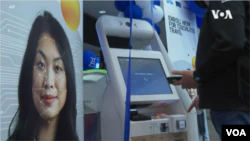San Francisco International Airport and United Airlines are experimenting with the first domestic airline technology in the United States with a technology that will enable flight management with minimal communication between passengers and agents. Those surveyed say the technology could make travel services more secure during epidemics. In this report, VOA correspondent Mariyama Diallo reports that in order to limit physical contact with agents, passengers taking part in the test must first attach their driver’s license to a facial scan.
Sherry Stein, head of technical strategy at Switzerland-based Sita America, said: We are hopeful that TSA will also be able to add the checkpoint of the Transportation Security Administration. You scan your driver’s license, take a photo, and then you’re done. This method will only quickly pick up a picture of you at all the entrances you cross. This way the technology will determine if you have a boarding pass by verifying your credentials.
It’s a special way to reduce the need for connectivity between airport agents and air travelers, and he says some people who travel by air often support the initiative. ” I travel one hundred and fifty thousand miles and I do it regularly. So, anything that saves me from any travel hassle will make my business travel process much easier. ” Passenger Minal Desai said, “If it works properly, it will be a great process and travel will be much easier in the life of every human being.”
The technology, developed by Switzerland-based Sita America, is already in use for international flights to other airports around the world, including Athens, Beijing and Doha, but this is the first attempt to implement it for domestic airlines in the United States. Sherry Stein, head of the City America technology strategy division, said: “What we’ve been able to do so far is to use this technology to accommodate all in-flight passengers operating within the country. Percentage is right. ”
The company says that in addition to increasing security during an epidemic, it will also help close long lines at airports. “The technology certainly has many good aspects. “It’s definitely going to be more convenient for everyone because of the lack of connectivity between people.”
But Justin Brookman, director of technology policy at Consumer Reports, said there were “concerns.” We’ve got a lot of news and we’ve seen that a lot of information is stolen as a result of hacking into computers. The problem is exacerbated when data is being stolen from biometric databases, biometric data is stolen and copied, for example fingerprints are relatively easy to make and facial contours are possible. ” He also expressed concern about the long-term impact of biometric tracking on people’s lives.
Meanwhile, in response to privacy concerns, the agency said passenger information is not permanently stored at the airport and that information is automatically deleted after the flight is over.










